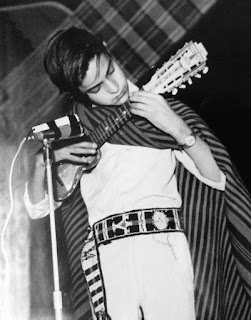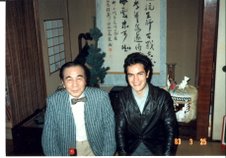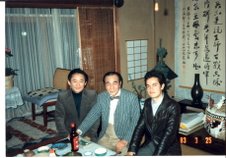Beethovenianas bolivianas, No. 1
At this bizarre
conjuncture maybe I should be saying, as Samuel Beckett said to Edna O’Brien
when she asked if he was writing anything: “and what use would it be, anyhow?” What
use, indeed, if he was on his deathbed and if any lines he might pen at that
point could be his last, going nowhere, leading to the completion of no
meaningful work?
In my case, I am
composing, but not in any sense I might have been at any time before.
The circumstances of the
last year have precluded a proper immersion in creative work. I have remained
productive, first of all in order to fulfil existing commitments, such as LoA
(Sage Gateshead, September 2018) and A Northumbrian Anthem (August
2018). Composing them was difficult, not least in a logistical sense, with no
music keyboard or even of an alphanumeric keypad, which until then had seemed
essential for music notation input. But the effort also helped to sustain me when
things were hard, and to focus on something positive.
After that, other
pressing challenges - not of a musical kind - absorbed my energies. But it was not possible to defer
composing for very long. Writing music was and is essential to who I am, and to
abandon it for any length of time would endanger my sense of self.
After some struggle, I found a compromise: I could go on composing by writing shorter, less
demanding pieces in the crevices of time and strength the situation allowed. And, since we
don’t know how long I will be in a position to continue to write music, thoughts have to turn to debts, that is, pieces I had been feeling for some time that
there was a moral imperative to write. That was the case of the choral piece A
Don Franklin (October 2018), a homage to Franklin Anaya Arze which is
intended to rectify an imbalance left by the oft-performed (too oft, I wonder?)
Himno al Instituto Laredo (1979).
There are also what
could be termed aesthetic debts to repay. I cannot forget the mission statement
I came up with in a late-night conversation with my eldest sister, Beba, back
in 1970 or 1971. I was twelve or thirteen then, and was in the process of discovering
the classical repertoire after a few years spent playing folk and traditional
music. I told my sister that my ambition was to absorb the technique of the
classical masters to put it at the service of a new folk music. I said words to
the effect that my music would have to be a conversation between the two
traditions. Mind you, I had not heard much twentieth-century music at that
point.
Naïve and juvenile perhaps,
but that manifesto was sincere, and in some important ways I have adhered to it.
There is no denying that my immersion in classical music became total for many
years – as it had to be, given how much there was to learn. But it is equally
undeniable that the “classical” music I wrote throughout the 1970s in Bolivia (say,
Rapsodia, or Misa de Corpus Christi) was, recognisably, also folk
music. In the following decades I wrote music which, to British and USA
audiences, might sound “very Bolivian” (or, for those who know less, “very Latin”),
whereas for Bolivian audiences it would sound “very classical” (or, for those
who know less, “very contemporary”). Those are typical reactions from audiences.
Each constituency would be aware of the otherness. This could mean that, as in today’s
BBC bias argument (“if all sides are unhappy they must be getting it right”), I
have been hitting the right spot. Or it could mean that, whatever the
demographic of my audience, they find my music alien.
Do we want to be defined
in terms of our otherness? I am sure I am not the first composer to ask this
question. Of course, the absolute majority of creative artists would like to be
perceived as original. But do we want to be perceived as other? As alien,
even? What would the opposite of that be? What would it be like to be
recognised as familiar, kindred, relevant, congenial? How would that music
sound? Unappealing thought, especially if we think of the traits such music
would need to have to sound familiar, kindred, relevant and congenial to
listeners – present or future – of today’s contemporary music.
The thought is more appealing
to me if I imagine a Bolivian listener – Latin American, even, and not
necessarily one from the thinly-populated spheres of contemporary music
audiences – recognising what I write as familiar, kindred, relevant or
congenial. What would that music have to sound like? Have my decades of working
immersion in classical music first, and then in contemporary classical music,
distanced me beyond recall from that listener? To the first of these two
questions I have been addressing my thoughts for quite some time. To the second,
I do not have to think to answer: the answer is no.
I am not, I cannot be too
far removed from a Bolivian, or Latin American, who is sufficiently interested
in music to listen to something I have written. I would go further: I cannot be
too far removed from any listener from any origin who happens to cross paths
with my work. Not if by “being far removed” we mean that my music leaves them
behind by virtue of being too rarefied. The reverse is more likely to be the
case, and I am sure it has happened already. In the lofty echelons of post-serial
music practice and thinking, I am pretty sure my music must have been dismissed
many times as “post-tonal” or “emotive” or other such dirty words from the
avant-garde lexicon – not that I have heard them; I would be very unlikely to,
since such circles are oh so universally polite. These high spheres are prone
to exclusivism, and my heart does not ache unduly at being excluded from them,
other than to regret the denial of access to some superb performers and
performance opportunities. It must be said, however, that I suspect that the
reasons for the exclusion are not musical, or not always.
If those stratospheric practitioners
and thinkers have shown mistrust towards my serious works – the quartets, the orchestral
pieces, Approaching Melmoth – perhaps I ought to shudder at what they would
say about my efforts of the last year. But I am past shuddering. I am too busy facing
real dangers in other parts of my life. Let the lofties sniff, let them sneeze,
let them choke if they have to. I have a job to do, and not many months to do
it.
To what extent national
identity can be part of a recipe for originality is debatable. I have no
intention to use mine in that way, and am under no illusion that being Bolivian
will save me from oblivion. All I know is that I started off as a folkie; a
premature one, maybe, but an earnest one; I was serious about what I did back
in 1969 and 1970. Are you too young to be serious about what you do at that
age? Well, I wasn’t (too young), and I was (serious about what I did).
I started off as a
folkie, I was saying, and then life put other exciting music in my way. I loved
this even more, but I also saw the need for consistency, for loyalty. So that
is what I came up with – the formula I confided to my sister. To save you scrolling
up, it was: “my music [will] have to be a conversation between the two
traditions [folk and classical].
I had hoped to have
plenty of time to consider this challenge in my maturity, but I may be being overtaken
by events. In an implicit sense all my work has been that: a dialogue of two
traditions – at least two. But a conversation in an explicit sense in which two
characters are put centre-stage and are seen to converse, distinctly enough for
any listener to distinguish between them, including that hypothetical listener who is not
used to contemporary music or even to classical music. Have I done that before?
I hadn’t, but I have now. This is the first attempt. Ideally it will be the
first of a series. Let us see.
The title should be
self-explanatory as to who the characters in the conversation are. The title is
also an affectionate homage to Heitor Villa-Lobos, who did something comparable.
He did it more subtly – but hey, mine is only the first of a series. Or so I
hope.
For those unfamiliar with the genre, the structure and rhythm correspond to taquirari, the emblematic genre from the eastern lowlands where I grew up. Is this a pastiche? Emphatically not. This is my mother tongue.
Until Trío Apolo of
Cochabamba have the chance to record it, all we have is the dreaded computer
simulation.





No comments:
Post a Comment